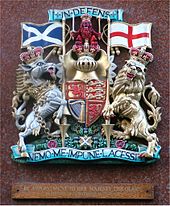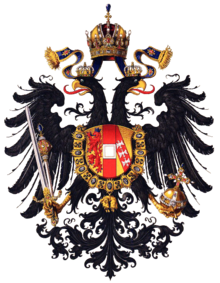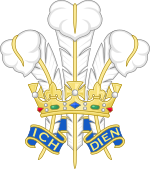Royal warrant of appointment
This article needs additional citations for verification. (August 2010) |
| |||||
Royal warrants of appointment have been issued for centuries to those who supply goods or services to a royal court or certain royal personages. The warrant enables the supplier to advertise the fact that they supply to the royal family, so lending prestige to the supplier. In the United Kingdom, grants are currently made by three members of the British Royal Family to companies or tradesmen who supply goods and services to individuals in the family. Several other royal families allow tradesmen to advertise royal patronage, including the ruling dynasties of the Netherlands, Belgium, Thailand, Denmark, and Sweden.
Suppliers continue to charge for their goods and services — a warrant does not imply that they provide goods and services free of charge. The warrant is typically advertised on company hoardings, letter-heads and products by displaying the coat of arms or the heraldic badge of the royal personage as appropriate. Underneath the coat of arms will usually appear the phrase "By Appointment to..." followed by the title and name of the royal customer, and then what goods are provided. No other details of what is supplied may be given.
History
The earliest recorded British royal charter was granted to the Weavers’ Company in 1155 by Henry II of England. [1]
Royal warrant holders

Warrants are currently granted for the Queen, the Duke of Edinburgh and the Prince of Wales. Warrants issued by the Queen Mother automatically expired in 2007, five years after her death.
Some 800 individuals and companies, including a few non-UK companies, hold more than 1,100 warrants to the British Royal Family. Suppliers must have had a trading relationship with an individual in the family for at least five years before they can be considered for a warrant. Warrants are awarded at the discretion of the Lord Chamberlain, acting as the chairman of the Royal Household Tradesmen's Warrants Committee. Warrants are awarded for renewable terms of five years, though they can be revoked at any time; some warrants have been held for more than 100 years. Goods need not be for the use of the grantor. Cigarettes were only bought for the use of guests for example, but these warrants were cancelled in 1999 as a matter of public policy.
Royal warrants are only awarded to tradesmen. The professions, employment agencies, party planners, the media, government departments, and "places of refreshment or entertainment" (such as pubs and theatres) do not qualify.[1]
A directory of royal warrant companies is available at the website of the Royal Warrant Holders' Association.
Features on products and services provided exclusively by royal warrant holders is available at The Royal Purveyors
Purveyors to the Imperial and Royal Court of Austria-Hungary



- Augarten porcelain – porcelain and china
- J. A. Baczewski – vodka
- Bakalowits – crystal chandeliers
- Jan Becher – herbal bitter
- Lucas Bols – liqueurs
- Ignaz Bösendorfer – pianos
- Christofle – silverware
- Courvoisier – cognac
- Demel – chocolate and confectionery
- Farina Gegenüber – eau de Cologne to Franz Joseph I (1872)
- E. Fessler – ovens
- Móric Fischer de Farkasházy, owner of Herend Porcelain Manufactory – porcelain
- Café Gerbeaud – cakes and pastries
- Gräf & Stift – carriages
- Hancocks & Co – jewelry
- L. & C. Hardtmuth – ovens and pencils
- Antoni Hawełka - catering
- J. A. Henckels – knifes
- Hotel Imperial – catering
- Liebig's Extract of Meat Company – processed meats
- Löblich & Co. – heating
- Lohner-Werke – carriages
- Rémy Martin – champagne
- Moët et Chandon – champagne
- Moser (glass company) – glass and crystal
- Ferdinand Mülhens, owner of the 4711 (brand) – perfume
- G. H. Mumm – champagne
- Paulaner Brewery – beer
- Peek Freans – cookies
- Pilsner Urquell – beer
- Rieger Orgelbau – organs
- Louis Roederer – champagne
- Royal Worcester – porcelain
- Eduard Sacher, owner of the Hotel Sacher – cakes and pastries
- Robert Schlumberger von Goldeck – sparkling wine
- Schweighofer – pianos
- William Steinway – pianos
- Baron Raimund von Stillfried – photos
- Gebrüder Thonet – furniture
- Michael Thonet – furniture
- Charles Lewis Tiffany – jewelry and silverware
- Törley – sparkling wine
- Underberg – digestif bitter
- John Thomas Underwood – typewriters
- Veuve Clicquot – champagne
- Nathaniel Wheeler – sewing machines
- Wilhelm J. Sluka – cakes and pastries
- Zwack – herbal liquors
Royal warrant holders of the Court of Belgium
List of royal warrant holders (select 'complete list')
Purveyors to the Royal Danish Court

There are approx 100 purveyors to the Danish Court, including:
- Anthon Berg – chocolate
- Bang & Olufsen – audio equipment
- Bing & Grøndahl – porcelain products
- Carlsberg Group – beverages
- Ceres Brewery – beverages
- ECCO – shoes
- Egmont – media products
- Galle & Jessen – chocolate
- Georg Jensen – silver products
- Holmegaard Glass Factory – glass
- Lego Group – toys
- Ole Lynggaard Copenhagen – jewellery
- Royal Copenhagen – porcelain products
- TDC – telecommunication
- Toms International – chocolate and confectionery
- Tuborg Brewery – beverages
Purveyors to the Dutch Court
The status 'purveyor to the court' (hofleverancier) is awarded to small and medium sized businesses that have existed for at least 100 years, and who have a good reputation regionally.[2] They need not actually supply goods to the court. The status is renewable every 25 years. At present there are at least 387 companies who can hold this status.[3]
For large, multinational, enterprises and for non-governmental organizations the use of the designation koninklijke or royal can be awarded.[4] These enterprises are also allowed to incorporate a crown in their logo. Examples are KLM Royal Dutch Airlines, Royal Dutch Shell, Royal Philips Electronics, and KPN.
Purveyors to the Court of Sweden

Various companies provide, or have provided, goods to the Royal Court of Sweden. To qualify for a royal warrant the order must come from either the King or Queen of Sweden and the company must deliver its goods or services to the court. A royal warrant is personal and usually awarded to the managing director of the company rather than the company itself. All goods and services are paid for by the court.[5]
Purveyors to the Japanese Imperial Household Agency
After World War II, the permission system was abolished, but purveyors still exist today
- Nissin Foods – food
- Toyota – motor vehicles
- Manyoken – catering
- Yamada Heiando – lacquerware
Purveyors to the Court of France
- Moutard – printer and bookseller to Queen Marie-Antoinette, to Princess Marie Joséphine of Savoy, and to Princess Maria Theresa of Savoy (1770–1792)
- Marc-Etienne Janety – master goldsmith and jeweler to Louis XVI (1777–1792)
- Farina Gegenüber – eau de Cologne to Napoleon I (1811) and to Napoleon III (1867)
- Debauve & Gallais – chocolates to Louis XVIII (1819)
- Guerlain – eau de Cologne to Napoleon III (1868)
High Patronage of the Monaco Royal Family
- Chocolaterie de Monaco – chocolates
- British Theatre Season, Monaco – theatre
Purveyors to the Portuguese Royal Family
- Farina Gegenüber – eau de Cologne to Luís I (1866)
Purveyors to the Romanian Royal House

- Farina Gegenüber – eau de Cologne to Carol I (1881)
- Murfatlar SA – wines to Michael (2003)
- Frottirex – bath towels and bedding to Michael (2005)
- Doina Levintza – clothing and accessories to Michael (2005)
- Dan Coma – clothing and accessories to Michael (2005)
- Halewood International – Rhein extra sparkling wines to Michael (2006)
- SC Transavia SA – chicken meat to Michael (2005)
- Principal Company SA – Salonta sausage products to Michael (2007)
- Biborţeni – mineral water to Michael (2008)
Purveyors to the Court of Prussia
- Farina Gegenüber – eau de Cologne to Friedrich Wilhelm IV (1841), Wilhelm I (1871), to Friedrich III (1888) and to Wilhelm II (1888)
Purveyors to the Court of Bavaria
- FA Ackermanns Kunstverlag – art publishing (1879)
- Eilles – coffee and tea (1873)
- Farina Gegenüber – eau de Cologne to Ludwig II (1872)
- Fr. Ant. Prantl – printing and leather goods (1797)
Purveyors to the Italian Royal Family
- Acqua di Biella – eau de Cologne to Umberto I (1878)
- Ballarino (Cavour) – jewellery to S.A.R. the Prince Amedeo of Savoy, patent n° 01/07
- Baratti & Milano (Turin) – sweets
- Bianchi – cars
- Caffarel (Turin) – chocolate
- Caraceni (Milan) – clothes
- Fratelli Carli (Imperia) – olive oil
- Farina Gegenüber – eau de Cologne to HM King Vittorio Emanuele II (1876)
- Florio (Marsala) – wine
- Gancia – wine
- Marinella (Naples) – ties
- Martini & Rossi - liquor
- Musy, Padre & Figli (Turin) – jewellery
- Pernigotti – chocolate
- Petochi (Rome) – jewellery
- Prada (Milan) – clothes
- Sperlari – food
Purveyors to the Russian Imperial Family
- Farina Gegenüber – eau de Cologne to Nicholas I 1843
- Fabergé – jewellery to Nicholas II
- Smirnoff – vodka
- Cristal – champagne
- Steinway & Sons – pianos
References
Notes
- ^ a b "The Royal Warrant Holders Association". www.royalwarrant.org. Archived from the original on April 2, 2008. Retrieved 2008-06-02.
- ^ [1][dead link]
- ^ List of purveyors to the Dutch court
- ^ [2][dead link]
- ^ "Royal Warrant Holders in Sweden - FAQ". www.hovlev.se. Retrieved 2008-06-02.
Bibliography
- By Appointment: 150 Years of the Royal Warrant and Its Holders, Tim Heald, Queen Anne Publisher (2 Nov 1989), ISBN 0356170993
External links
- Royal Warrants explained on the royal.gov.uk website
- The Royal Warrant Holders Association







